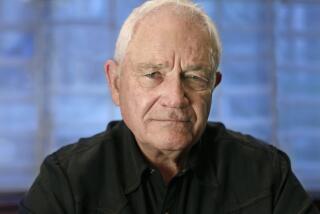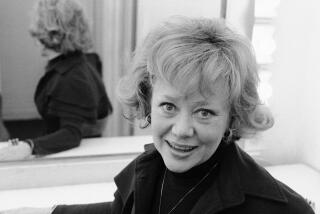Sir Richard Rodney Bennett dies at 76; composer had 3 Oscar nods
Sir Richard Rodney Bennett, a prolific British composer, arranger and pianist whose film scores were nominated three times for Academy Awards, has died in New York City. He was 76.
Bennett died Dec. 24 after a brief illness, his publisher Novello & Co said in a statement.
[For the Record, 2:50 p.m. PST, Dec. 30: A previous version of this post cited the title of the film “Far From the Madding Crowd” as “Far From the Maddening Crowd.”]
In 1967, Bennett was nominated for his first Oscar for the score of “Far From the Madding Crowd.” That was followed in 1971 by nominations for his music in “Nicholas and Alexandra” and three years later for “Murder on the Orient Express.” He also wrote the score for the 1994 film “Four Weddings and a Funeral.”
A student of the French composer Pierre Boulez, Bennett’s compositions evolved during his career from avant-garde to a more tonal style. A fan of the Great American Songbook, he performed as a pianist with British jazz singer Claire Martin, and recorded music by George Gershwin, Irving Berlin, Jerome Kern and Harold Arlen.
Bennett’s extensive output included five operas, 50 scores for film and television and more than 200 works for the concert hall. He also wrote popular arrangements of Christmas carols.
“Richard was the most complete musician of his generation — lavishly gifted as a composer, performer and entertainer in a multiplicity of styles and genres,” said Chris Butler, head of publishing for the Music Sales Group in London.
The youngest of three children, Bennett was born March 29, 1936, in the town of Broadstairs near the English Channel. With the outbreak of World War II, his family moved to the safer area of Devon. His father, Rodney, was a writer of children’s books. His mother, Joan, was an accomplished pianist and composer and an early musical influence on her son.
“People ask what was the first piece of music I wrote. There was no first piece,” Bennett said in a 2011 interview with the Guardian newspaper. “I just scribbled away and eventually a C-major chord was there. I didn’t ever decide I was going to be a composer. It was like being tall. It’s what I was. It’s what I did.”
In 1979, he moved to New York, later saying he felt creatively stifled in Britain and at loose ends after the breakup of a love affair. Stephen Sondheim and Leonard Bernstein supported his application for a green card.
“I was doing a lot of things out of guilt,” he told the Guardian. “I hated teaching composition. I was playing music I didn’t particularly want to play, being on committees I didn’t want to be on. I wanted to write music and cook and play cards and have a nice time.”
In New York, he indulged his passion for jazz, accompanying jazz singer Martin in shows at the Algonquin Hotel and drawing praise from the New York Times as “a sensitive, truly intimate collaborator.”
Bennett also assisted Paul McCartney with his original classical work “Standing Stone,” offering criticism and comments on sections faxed to him by the former Beatle.
“I sent him one, thinking it was pretty good,” McCartney later recalled. “A few minutes later, I got a fax back with the word ‘feeble’ scribbled across it.
“I phoned him straight back and said, ‘Richard, that’s what my teacher wrote on my essays. You’re a sensitive artist, and if you don’t like something, could you please write, ‘That’s a little below par’?”
In 2005, Prince Charles commissioned Bennett to write “Reflection on a Scottish Folk Song” in honor of the prince’s grandmother, Queen Mother Elizabeth.
Bennett was knighted in 1998.
More to Read
Start your day right
Sign up for Essential California for the L.A. Times biggest news, features and recommendations in your inbox six days a week.
You may occasionally receive promotional content from the Los Angeles Times.






